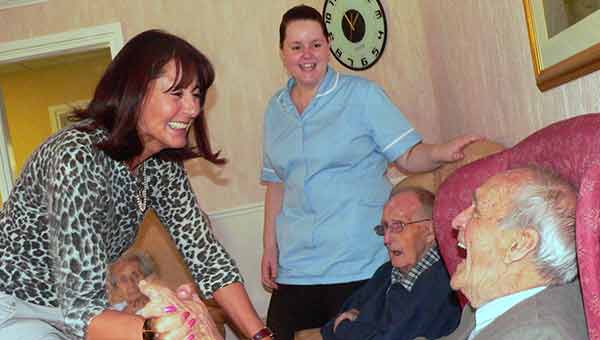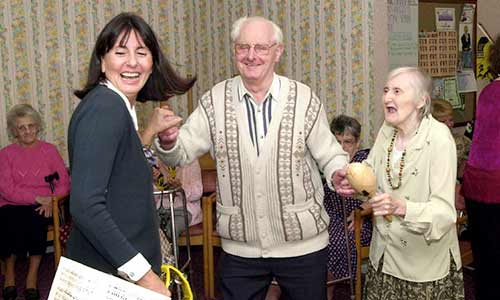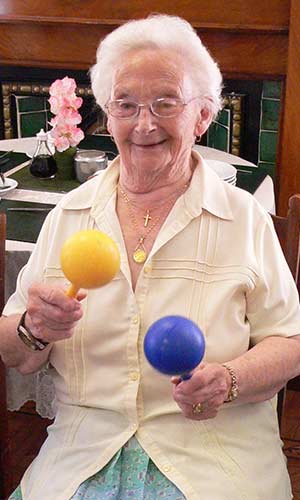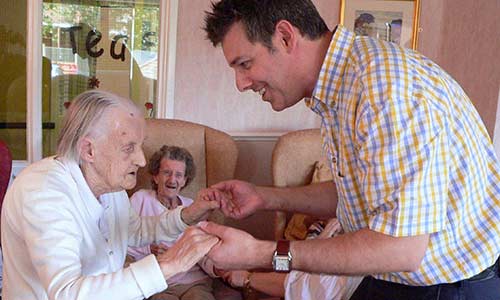Music for Memory
Music For Memory uses music to provide therapeutic support to people living with dementia

As populations of developed nations age, so the number of cases of dementia increases. As a way of helping care for and support people with dementia, music has been shown to often have a dramatic effect.
Whether it's 60s soul, operatic arias or songs from the shows, music can soothe, stimulate and bring to mind long-forgotten memories. Nick Smurthwaite investigates...
Dementia is rapidly becoming the health and social care challenge of the 21st century. Numbers affected are set to soar because of an expanding older population.
The total number of people with dementia in the UK is predicted to be in excess of 1m by 2021. So, while there are no long-term cures, ways of alleviating symptoms are becoming more available and accessible.
 The power of music, especially singing, to unlock memories and kickstart the grey matter is an increasingly key feature of dementia care. It seems to reach parts of the damaged brain in ways other forms of communication cannot.
The power of music, especially singing, to unlock memories and kickstart the grey matter is an increasingly key feature of dementia care. It seems to reach parts of the damaged brain in ways other forms of communication cannot.
'We tend to remain contactable as musical beings on some level right up to the very end of life,' says Professor Paul Robertson, a concert violinist and academic who has made a study of music in dementia care.
'We know that the auditory system of the brain is the first to fully function at 16 weeks, which means that you are musically receptive long before anything else. So it’s a case of first in, last out when it comes to a dementia-type breakdown of memory.'
Many music students throughout the UK, as well as more experienced musicians, now regard care home visits as part of their learning experience. As well as being enormously beneficial to those with various forms of dementia and their carers, they can also be helpful and rewarding for the musicians themselves.
Organisations like Singing for the Brain, Music for Life, Lost Chord, Golden Oldies and Live Music Now have made it possible for every care home in the country to have access to live musicians, both professional and amateur, most of them trained to deal with the special needs of an elderly, memory-impaired audience.
 'We aim to reach every person in the room,' says Helena Muller, founder-director of the Yorkshire-based Lost Chord. 'What we don’t want is musicians going into a room and standing behind a music stand. They have to be proactive and stimulating in order to keep the attention of this audience. We have one flautist who dances round the room like the Pied Piper.'
'We aim to reach every person in the room,' says Helena Muller, founder-director of the Yorkshire-based Lost Chord. 'What we don’t want is musicians going into a room and standing behind a music stand. They have to be proactive and stimulating in order to keep the attention of this audience. We have one flautist who dances round the room like the Pied Piper.'
Lost Chord regularly visits homes in South Yorkshire, Derbyshire, London, Cardiff, Coventry, Ipswich and Bury St Edmunds, providing more than 100 live music sessions a month. Helena says it's essential to make regular visits to the same homes, so the musicians can build a relationship with the residents, and get to know their names.
'It's usually a singer and an accompanist,' says Helena. 'I encourage them to use a wide cross-section of music so there is something for everyone. It is important that they are flexible and adapt their repertoire to the needs of the residents and their carers.'
Music For Memory uses music to provide therapeutic support to people living with dementia
 Singing for the Brain, which is run by the Alzheimer’s Society in 30 different locations nationwide, aims to boost confidence, self esteem and quality of life by involving people with dementia and their carers in interactive sing-song sessions.
Singing for the Brain, which is run by the Alzheimer’s Society in 30 different locations nationwide, aims to boost confidence, self esteem and quality of life by involving people with dementia and their carers in interactive sing-song sessions.
It started when founder Chreanne Montgomery-Smith, while working in a nursing home, noticed how many residents responded positively to music. 'One of the activities I did with them was a quiz which involved playing familiar tunes.
'The first week I did it nobody sang, the second week a few people joined in. By the third week everybody was singing along. One lady who didn’t know her own name knew every song in the quiz and sang them all.
'It made me realise that people with dementia had a special ability to remember songs. Even if people with dementia can’t talk, they may be able to sing, whistle, clap or tap their feet. It helps them, and their carers, to feel life is worthwhile.'
 Paul Robertson recalls playing for a former church organist with advanced dementia. 'She was very far gone, no language, no recognition. Someone started singing a hymn and this woman sat down at the piano, found the right key and accompanied the singer in perfect order.'
Paul Robertson recalls playing for a former church organist with advanced dementia. 'She was very far gone, no language, no recognition. Someone started singing a hymn and this woman sat down at the piano, found the right key and accompanied the singer in perfect order.'
Cellist Claire Garabedian, who is studying the effects of live and recorded music on people with dementia at the University of Stirling, has also seen for herself the transformation of people who may appear to be in a vegetative state. 'Even when someone can no longer talk,' she says, 'music becomes an avenue for communication and engagement. It seems to access parts of the brain that remain unaffected by the ravages of dementia.'
Claire believes more could be done to harness music therapies for end-of-life palliative care. 'This is a growing population and there is a real need now for non-pharmaceutical solutions.'
Every year our Advice Service deals with thousands of calls from older people in need. Call us today to make sure that you are receiving all the help and support available to you.